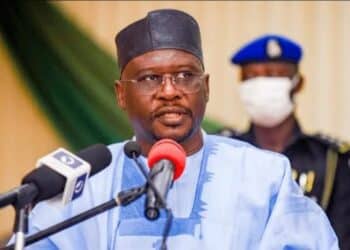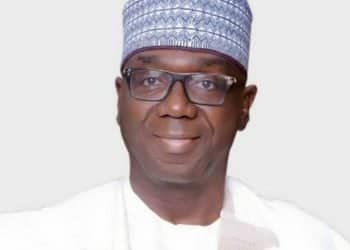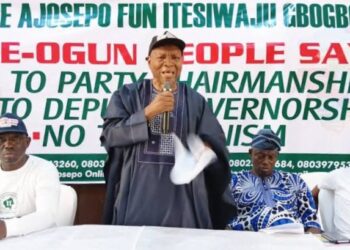The Former Attorney General and Commissioner for Justice in Oyo State, Mr. Oluseun Abimbola (SAN), was Olayinka Agboola’s guest on Splash 105.5FM’s Radio Show, Parrot Xtra/Ayekooto on Radio recently. During the interaction, he alluded to why local governments in Nigeria may never be truly independent. Excerpts:
You once served as the Oyo State Attorney General and Commissioner for Justice during the late Governor Abiola Ajimobi’s administration. Are you still involved in politics today?
There is no one without a political spirit in them. One thing leads to the other, both the one who occupies a position and the one who does not occupy any political position. The issue of politics in Nigeria continues to metamorphose. I returned to legal practice when I left office as the Attorney General. I am not an active politician in the field, though I sympathise with the All Progressives Congress (APC) government.
Are you still interested in contesting for any elective post?
I can also contest to become a Governor, even though not everyone who aspires for political office will eventually get it. God knows each of our aspirations.
There are controversies surrounding the emergence of the APC’s gubernatorial candidate. How will you advise the party to sort out the issue of his ‘legitimacy’?
I do not know what you mean by ‘legitimacy’.
Recently, your senior colleague, Chief Adeniyi Akintola, went on air and attacked the party’s leadership in the state on the issue. What is your reaction to this?
Like I said earlier, there are active players on the political field, and some people may understand what might have transpired between them. I cannot speak to that because I do not know what transpired between them and I was not privileged to be part of their discussions. On the other hand, all political parties have their challenges. It is the same in APC, PDP, and other parties. I think the problem is that our political culture is still underdeveloped. We often do not want any person to have the lead or leverage because of our aspirations.
I understand that if I do not become what I aspire to be today, tomorrow is always there for me. However, the political culture in this part of the world is that we want it now, without waiting for the appointed time. It is important to recognize that you are not the only one interested in it; the most important thing is building a nation.
During your tenure as the Attorney General in Oyo State, you were responsible for all legal advice to the state government and its agencies; do you remember your most challenging tasks then?
Yes, there were several of such because the state is made of hands and legs. When the hands and legs work in an uncoordinated manner, doing different things without first seeking the opinion of what the law says, then you have issues.
I thought you would talk about that time you crowned several kings in Ibadan…
That was the least of the issues because that process followed the process of law. The Court of Appeal validated it and that shows it followed the law. Like I said, we found a political solution to it, but one more important thing is that we handled many issues that did not appear on the pages of newspapers.
There was a claim against the government regarding liability that the previous administration approved the sum of 50 million dollars. We managed to resolve it in a way that God helped us and we eventually won the case.
Furthermore, many other cases, programs, and projects were computerized. One different part of this was that the law was modified, particularly for the judiciary at that time.
We set up the multi-door court, the Customary Court of Appeal, Family Court, and the Grade A Customary Court. Many of these institutions were built and legitimized at that time, and they are still running.
What will you say was your major achievement during your tenure?
All those institutions came in while I was serving as the Attorney General and had Governor Abiola Ajimobi’s support. One of them was establishing a judicial process to facilitate access to justice for the common person; any aggrieved person can walk into the Oyo State multi-door court and file a matter that will be resolved amicably without going through litigation. Even though I met it there, I enhanced the centre’s capacity at the Ministry of Justice. We amended the law to make it enforceable that justice would be served if someone defaults.
What were the major challenges you encountered during that period?
We never had enough money to do as much as we wanted.
Recently in Nigeria, a family secured the validation of a 50-year-old document to recover over 200 plots of land in a well-built area in this state. The family claimed they had a superior title over the Certificate of Occupancy (C of O). Is there any superior title to it?
The major problem we have is the lack of support structure to implement some of these laws. On the face of the law, the owner of the C of O is the rightful owner of the property, however in the case of litigation; the judgment of the court overrides the certificate of occupancy.
Furthermore, the court has the right to strike out a case if there is a good reason, not an arbitral reason. When someone comes with a 50-year-old judgment, a provision in the law allows you to validate and enforce the judgment. The law allows for revalidation, which might come alongside certain requirements and procedures.
There is a new trend in Oyo state in which a family might come up with a narrative claiming that their forefathers are the rightful owner of some particular piece of land. They may further attempt to take legal steps to acquire the land. Many people do this because of idleness and greed. Their ancestors sold most of these lands a long time ago.
What are the implications of this kind of development for the state wooing potential investors?
The 2016 anti-land grabbing has done justice to that. The issue is that people are unaware of the law, and the Nigerian police need to be educated about implementing the law. The law travels far and wide.
This law is not just about land snatching. It further states that if you claim to have acquired documents for your land, you must go through the legal process and get the legal backing from the court to enforce the judgment.
However, before the court rendered its judgment, the court would have specified the exact location of the land (where it begins and ends). This is what we refer to as the dispute survey plan.
What is your take on the issue of local government autonomy in Nigeria? The National Assembly recently approved an amendment process forwarded to the states’ assemblies to rectify. However, only 10 states have reportedly passed the law. How do you view this?
It is desirable to have that constitutional amendment. Still, it should be known that it is not the only proposed amendment before the States’ Houses of Assembly—there are about 23 or more amendments that will follow the same process. If some states are having issues with a few of the proposed amendments to the constitution but they have no problem supporting local government autonomy, then local government autonomy law will automatically suffer for it.
It is just that some States’ Houses of Assembly are not focusing on doing what is necessary, which they know is right. Some laws included in the constitutional amendment do not sit well with some states that support local government autonomy, and this is the reason they are against pushing the bill. This means that our local governments may not become independent soon.
Is the present constitution a major problem for the country?
Undoubtedly, the constitution is a problem, but the people are the bigger problem. Even if the law is weak and faulty, what we need are elected representatives with good intentions to change such obnoxious laws; failure to do so will make the constitution look incapable.
If we can find lasting solutions to the present challenges facing the constitution, it will settle many issues affecting the country’s progress.
In addition, changing the constitution will be fruitless if our people do not desist from doing evil. Many of our elected representatives need to be humane and committed to governance. Usually, a constitutional amendment process will come with constitutional amendment acts. That act will contain all the clauses to be amended concerning different material issues.
Furthermore, the local government amendment autonomy is one of the issues pushed forward among others while the case of the Value Added Tax (VAT) did not sail through although the Supreme Court is yet to give its judgment.
Others include the issue of redefining indigene-ship to allow residents who have lived in a place for a period to become automatic indigenes of that place. However, in the context of Nigeria’s cultural situation, this is almost impracticable because it might not be fully implemented.
To reduce the problem of preferential treatment some regions of the country are enjoying, the structures on the ground should be reworked before such a proposal is made. Some States’ Assemblies will not pass the bill of local government autonomy until many issues are addressed.
Is restructuring part of the constitutional amendment?
The proposed amendment is not part of the restructuring. These are some of the reasons why some states have developed cold feet about local government autonomy when the country’s most pressing issues are not addressed.
What admonition do you have for President Buhari and our politicians?
The most critical factor affecting the country’s unity is everyone’s suspicion of the other. In every region, groups are suspicious of one another. The head unites the body; no region should be given preferential treatment because trust is earned and not conferred.
The president must unite the country, irrespective of the sacrifices, and be ready to move away from entitlement to equity.
This same principle applies to the president and every political office holder. It is a demonstrable action, and it must be seen as such. The law says justice must not only be done but also prevail.
How did Nigerians find themselves in this mess they are in today?
It gradually slid into decay, starting from the corruption that had grown over time. People have substituted values for benefit and merit for preference. Amnesty today is also a problem since everyone claims it as a political tool. Militants and Boko Haram elements got amnesty, and some are proposing that bandits should also get amnesty. I am a die-hard believer in Nigeria, and I know those who have left Nigeria will eventually return.










